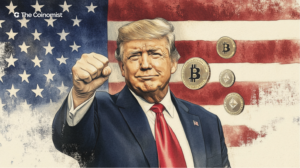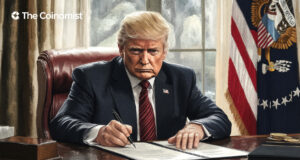How Do Potential U.S. Treasury Secretaries View Crypto?

Experts are speculating on who might lead the U.S. Department of the Treasury. Will the next Secretary be ready to embrace the crypto revolution? We explored the perspectives of potential candidates on digital assets to find out.
On this page
Donald Trump may announce the name of the next U.S. Treasury Secretary as early as next week. However, the president-elect’s team has not yet made a final decision on the candidate.
Fox Business journalist Charles Gasparino wrote that Trump’s team consulted with BlackRock CEO Larry Fink and at least one other senior executive from the firm, whose name has not been disclosed. Additionally, a meeting between Trump and Coinbase CEO Brian Armstrong is reportedly scheduled as part of preparations for forming the new administration.
At the beginning of November, billionaire John Paulson was considered the leading candidate for U.S. Treasury Secretary. However, he withdrew from the race last week, citing complex financial obligations. As a result, the list of contenders has shifted.
The prediction platform Polymarket has seen a surge in activity, with users betting on who will take on the role of Treasury Secretary. Daily trading volume in this pool has already exceeded $2 million, hinting that this race could revive interest in Polymarket, which saw a 75% drop in activity after the presidential election.
Related: Polymarket: The Cryptocurrency Prediction Platform
As of the morning of November 19, the top contenders include:
- Kevin Warsh – Former Federal Reserve official
- Scott Bessent – Founder of Key Square Group
- Marc Rowan – CEO of Apollo Global Management
- Howard Lutnick – CEO of Cantor Fitzgerald
- Bill Hagerty – U.S. Senator
- Robert Lighthizer – Former U.S. Trade Representative
Treasury Secretary Candidates. Source: Polymarket
Which of these candidates are more crypto-friendly, and what can we expect from them as potential Treasury Secretaries? Let’s delve into their backgrounds and views on financial markets to get a clearer picture.
Elon Musk’s Pick: Howard Lutnick
On November 20, it was announced that Howard Lutnick had been appointed as the U.S. Secretary of Commerce, officially removing him from the list of contenders for Treasury Secretary. Interestingly, the odds of his appointment to the Treasury role were only 2%, once again highlighting the accuracy of Polymarket’s electoral predictions.
Nonetheless, Lutnick stands out as a remarkable figure and a strong proponent of cryptocurrencies.
Lutnick serves as the CEO and Chairman of Cantor Fitzgerald, a financial services firm specializing in bond trading, currency markets, and alternative assets. Among crypto enthusiasts, the company is best known for providing custodial services for the majority of Tether’s stablecoin reserves.
Lutnick became widely recognized after the September 11, 2001 attacks, when Cantor Fitzgerald’s World Trade Center office suffered catastrophic losses. In the aftermath, he spearheaded efforts to rebuild the firm while supporting the families of employees who lost their lives.
Howard Lutnick, Cantor Fitzgerald CEO. Source: Medium
Beyond his financial expertise, Lutnick is well-regarded for his philanthropy, particularly through the Cantor Fitzgerald Relief Fund, which supports individuals impacted by crises and disasters.
Currently, he is one of Wall Street’s top bond traders and a member of the exclusive group of 25 primary dealers authorized to trade directly with the Federal Reserve.
Among all the potential Treasury candidates, Lutnick was one of the most supportive of cryptocurrencies. He was a keynote speaker at the high-profile Bitcoin 2024 conference in Nashville, which also featured Donald Trump.
During the event, Lutnick discussed the future of decentralized finance and announced a $2 billion BTC-backed lending program designed to provide leverage to Bitcoin holders. He has been a vocal advocate for classifying Bitcoin as a commodity, similar to gold or oil, and consistently calls for clearer regulations within the digital asset space.
As the new Secretary of Commerce, Lutnick has the potential to influence policies that could integrate Bitcoin into international trade. Who knows—his first call might even be to President Nayib Bukele of El Salvador.
Leading Candidate: Kevin Warsh
At 54, Kevin Warsh, a former member of the Federal Reserve Board, is currently the frontrunner for the role of U.S. Treasury Secretary.
Warsh is widely recognized as a crypto advocate, with his supportive stance on cryptocurrencies predating Donald Trump’s more recent pro-crypto shift.
In a 2021 interview with CNBC, Warsh remarked: “In a situation where the US dollar is weakening, Bitcoin appears to be a logical choice for an investment portfolio.” He has also described BTC as the new gold and supports Trump’s vision of incorporating Bitcoin into the U.S. National Reserve.
In 2022, Warsh invested in Bitwise, a leading issuer of Bitcoin and Ethereum ETFs. Additionally, he has voiced support for the creation of a U.S. Central Bank Digital Currency (CBDC), a position that contrasts with Donald Trump’s campaign promises to oppose any such initiative.
Related: CBDC Emerges as a Key Talking Point in the Presidential Race
Recent updates indicate that Trump’s team is generally supportive of Warsh’s nomination for Treasury Secretary. Reports suggest he has already received an official invitation to Mar-a-Lago, Trump’s residence, for discussions about the role. However, negotiations are still ongoing, and no final decision has been made.
Candidate #2: Scott Bessent
Scott Bessent, founder of the hedge fund Key Square Group and former deputy to George Soros, was once considered the frontrunner for U.S. Treasury Secretary.
Bessent gained notoriety on Wall Street for his substantial profits from betting against the Japanese yen and British pound alongside financial mastermind George Soros. This event, known as “Black Wednesday” in 1992, remains a pivotal moment in financial history.
Related: George Soros and His Theory of Reflexivity in Financial Markets
Last week, Bessent led Polymarket predictions with a 55% likelihood of nomination. However, Elon Musk, a trusted Trump advisor, publicly opposed Bessent’s candidacy, calling him a “business-as-usual choice.”
Musk argued that Bessent would maintain the status quo and lacked the innovation needed for the role of Treasury Secretary. Instead, Musk voiced his support for Howard Lutnick, praising his professionalism and forward-thinking approach. Musk even encouraged his followers to weigh in, resulting in Bessent’s odds on Polymarket dropping by 18% within hours.
Historically, Bessent has been seen as a traditionalist, with Associated Press previously describing him as a “crypto skeptic.”
However, Trump’s growing endorsement of cryptocurrencies appears to have influenced Bessent’s position. Recently, he stated: “I am very excited about the President's acceptance of cryptocurrencies, and I think this aligns very well with the Republican Party; cryptocurrencies represent freedom, and the cryptocurrency economy will continue to exist.” This marked shift in rhetoric has sparked speculation that Bessent might instead be considered for the role of National Economic Council Chair, though this decision remains pending.
Given Trump’s tendency to make decisions driven by emotion rather than strict logic, Bessent’s candidacy cannot be entirely dismissed.
The Dark Horse: Marc Rowan
At 62, billionaire Marc Rowan, co-founder and CEO of Apollo Global Management, has emerged as a potential wildcard for U.S. Treasury Secretary. Rowan has publicly expressed admiration for Elon Musk, positioning himself as an ally of Musk’s reformist vision.
At a recent investment conference, Rowan underscored the importance of Musk’s leadership in the Department of Government Efficiency (DOGE), calling it a vital global restructuring effort. According to Rowan, such reform is crucial for stabilizing the Federal Reserve and ensuring the long-term health of the economy.
Marc Rowan, co-founder and CEO of Apollo Global Management LLC. Source: Х
As an investment industry veteran, Rowan is a strong proponent of blockchain’s potential to revolutionize traditional finance. In an interview with David Rubenstein, he stated: “The ecosystem surrounding cryptocurrencies is remarkable. Many of the technologies and systems enabling NFTs are precursors to transformative changes in our financial system. Ignoring them poses a significant risk.”
Under Rowan’s leadership, Apollo has made significant investments in blockchain innovation, partnering with companies like Figure Technologies and Anchorage Digital. These collaborations have allowed Apollo to pioneer products such as blockchain-based digital mortgages, further highlighting Rowan’s forward-thinking approach to finance.
The Financial Times has described Rowan as a favorite among Wall Street elites, who consider him “one of their own.” However, skepticism remains about whether Rowan would leave his role as CEO of Apollo, a firm managing over $700 billion in assets, to take on the responsibilities of Treasury Secretary.
Most leading candidates for Treasury Secretary are notably supportive of cryptocurrencies, marking a potential shift toward regulatory liberalization and the emergence of a “crypto spring.” Among them, Senator Bill Hagerty is the least enthusiastic about digital assets, but his chances of being appointed are slim.
The race for the position remains dynamic, with fierce competition and occasional smear campaigns influencing the field.
Ultimately, Donald Trump’s decision will hinge on personal loyalty and alignment with his political agenda. Whoever is chosen, the policies of the next Treasury Secretary will reflect the priorities of the sitting president.
The content on The Coinomist is for informational purposes only and should not be interpreted as financial advice. While we strive to provide accurate and up-to-date information, we do not guarantee the accuracy, completeness, or reliability of any content. Neither we accept liability for any errors or omissions in the information provided or for any financial losses incurred as a result of relying on this information. Actions based on this content are at your own risk. Always do your own research and consult a professional. See our Terms, Privacy Policy, and Disclaimers for more details.




























